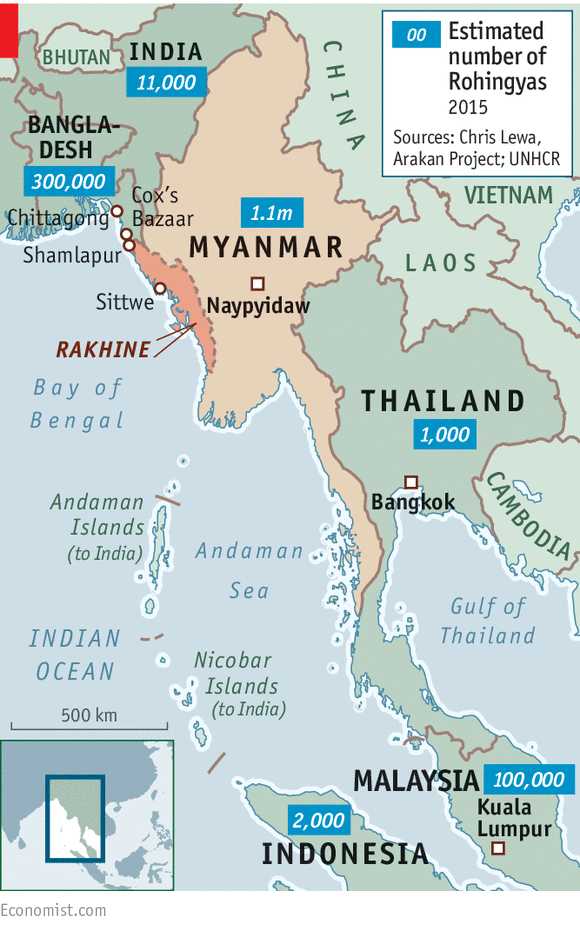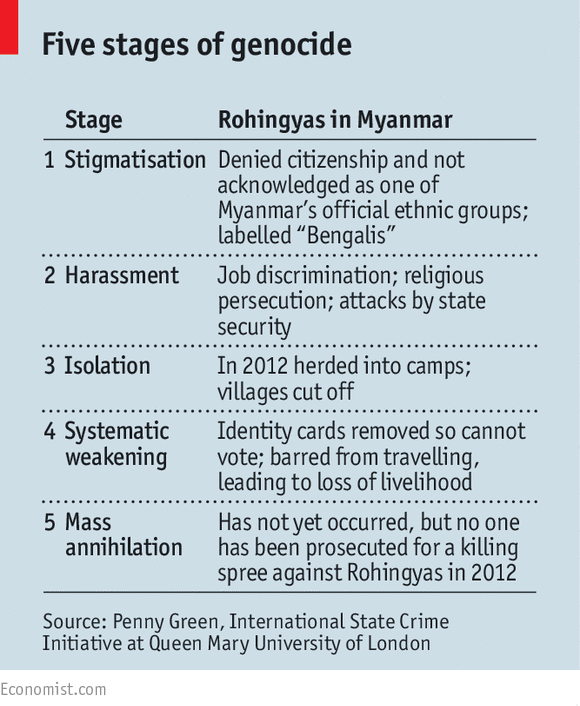Genocide.
We’re all fairly familiar with the word. This is a term we’ve read about, seen movies about, and written countless essays about. We’ve seen it over and over again in history. From the Holocaust to the Rwanda Genocide, the list goes on and on.
Most of us will spend our whole lives only witnessing a genocide from our living room as we watch the nightly news. We might not ever meet a person who has been ostracized, persecuted, or even tortured for their faith. If we’re lucky, we will continue to live a safe life in a country where we can voice our own opinions and beliefs, something that others in this world will never do.
I wish we could say that after one genocide or two, the world would become peaceful. People would miraculously stop killing and start treating each other as equals.
If only it were that simple.
If only it were that simple for the Rohingya people.
I’ve decided that it’s time to shed some light on the Rohingya people. Finally, their suffering has been brought to surface by the media. I am fortunate enough to interact with these people on a daily basis, but I’m assuming you don’t. The best way to learn about this is to hear it from someone working in the field. I am working in the middle of the conflict right now. I am teaching English at a Buddhist Burmese school where we have recently welcomed over 20 Muslim Rohingya children. To say that there is ethnic and religious tension here would be an understatement. My next couple of blog posts will be concerning the Rohingya issue and I hope it helps you gain a better understanding of what’s going on.
So let’s start with this:
The Top 10 things you need to know about the Rohingya –

- There are approximately 1.1 million Rohingya in Burma. They are a Muslim ethnic minority living in northern Rakhine State (economist.com).
- The Rohingya originally migrated from Bangladesh thousands of years ago.
- In 1982, Burma released a Citizenship Law that denies the Rohingya citizenship despite the fact that these people have been living in Burma for generations. (uscampaignforburma.org).
- “Burmese President Thein Sein outright denies the existence of the Rohingya as an ethnic group of Burma, calling them ‘Bengali’ instead. Labeling the Rohingya ‘Bengali’ is a discriminatory, xenophobic way of erroneously implying that Rohingya are illegal immigrants from Bangladesh” (uscampaignforburma.org).
- Several outbreaks of violence have occurred towards the Rohingya, but one specific incident, the rape and murder of a Buddhist woman, sparked off a deadly chain of events. One incident in June 2012 left over 200 dead and thousands displaced. The violent outbreaks have continued, ultimately leaving the Rohingya with no other choice but to flee.
- The Buddhists hate the Rohingya for their ethnicity and religion. According to some of my Buddhist friends, the Rohingya are known as “evil” people who should never exist. In October 2012, Rakhine Buddhist communities formed mobs to attack the Rohingya, setting their entire villages in flames. Rakhine State is a part of Burma where foreign journalists and NGO aid workers have limited access, making it difficult to track the details of the situation. However, “evidence of a massacre has been steadily mounting” (theguardian.com)
- According to the US Campaign for Burma, one of the biggest issues is that “government officials have enforced explicitly racist policies for decades” against the Rohingya and have “failed to intervene and even participated in violent attacks against Rohingya.” The corruption in the government has fed this genocide, encouraging violence against these people. The government has “subjected Rohingya and other Muslims to discriminatory restrictions and policies of apartheid and ethnic cleansing.” The UN officials have called the internally displaced persons (IDPs) camp in Rakhine State as the “most dismal and under-served IDP camps in the world” (uscampaignforburma.org).
- The Rohingya have been forced to flee Burma and seek refuge in neighboring countries, including Bangladesh, Thailand, and Malaysia. Thousands of Rohingya have hopped onto crowded, leaky, tiny boats and have risked their lives to cross the Andaman Sea, hoping to find refuge elsewhere. Traffickers take advantage of their vulnerability, bringing them on the ships to take them to a new country where they will be sold. Many of the Rohingya are fully aware that they are selling themselves into slavery, but they would rather pay the trafficker to get on the boat than stay in Burma. Marmod Toyo, a Rohingya man who has a wife and four children said, “There’s not enough food back home and no work. The human trafficker came and gave me money. I knew he might sell me, but I needed it.” During the journey on sea, traffickers starve them, abuse them, and in many cases, kill them (theguardian.com).
- Recently, the neighboring countries, such as Malaysia, Thailand, and Indonesia do not want to accept the Rohingya refugees. When the boat of refugees arrives at the pier, the countries refuse to take them in, leaving the traffickers to abandon the people on the boat and send them stranded at sea. No food, no water, no place to go, these people remain stranded at sea, hoping and praying to find a new home soon. In the past month, around 4,000 Rohingya have landed in Indonesia, Malaysia, Thailand, and Burma. The United Nations estimates around 2,000 migrants are still adrift somewhere in the Andaman Sea.
- Those who have been able to land in another country have fallen into the hands of traffickers. Recently, several camps filled with dozens of bodies in southern Thailand and Malaysia have been discovered. These have been the bodies of Rohingya people who have been taken to the trafficking camps and were tortured, starved, and killed. In Songkhla province, 26 corpses were discovered on May 1st followed by two skeletons in Phang Nga (that’s where I live). More corpses have continued to be discovered. After interviewing survivors, brokers, and police officials, NGO Fortify Rights says that these statements “suggest these grim finds may only scratch the surface of a much larger problem in which the Thai government is allegedly complicit….Survivors spoke of regular killings at camps, common graves, and torture at the hands of gang members trying to extort money from their families” (theguardian.com)

Brad Adams, Asia Director of Human Rights Watch says, “Each year, tens of thousands of Rohingya flee the dire human rights situation in Burma only to be further abused and exploited at the hands of traffickers in Thailand. The discovery of these mass graves should shock the Thai government into shutting down the trafficking networks that enrich officials but prey on extremely vulnerable people. Instead of sticking Rohingya in border camps or immigration lockups, the government should provide safety and protection” (theguardian.com)
For failure to combat trafficking, the US State Department recently downgraded Thailand to the worst possible rating on human trafficking: tier 3. This was displayed on the 2014 Trafficking in Persons Report.
Thailand is one of the worst countries to combat human trafficking.
Some Rohingya people are lucky enough to escape Burma, the country filled with religious persecution, sectarian violence, racist laws, internment camps, and lack of freedom. Those who leave the country that brought them so much suffering will enter another country and find themselves sold into slavery at the hands of the brokers. These are the brokers who promised them a safe refuge from Burma.
This crisis with the Rohingya people has received inadequate international attention. For all we know, this has been going on far longer than we think. Although we may be unsure of when it started, we should be entirely and unmistakably sure that it will end. Soon. Very soon. With the media picking up on the situation and the awareness spreading, there is no excuse not to step in for the sake of the Rohingya. We cannot let it continue. We cannot turn our backs on it.
As an English teacher, I feel powerless in this situation. I feel as though I am idly standing by while an entire race of people are being slaughtered. Recently, an exciting chain of events has unraveled, making me realize that I can make a much bigger impact on these victims of genocide than I ever imagined.
More on that later. For now, please share this post. Spread the awareness to your friends. Make sure everyone knows what is going on with the Rohingya people. Please check the news daily and keep up to date with the situation.
We cannot let these forgotten people remain forgotten.
Hey Sophie,
Thanks so much for writing this in such a concise and easy to understand format! It’s so true that genocide is occurring right in front of us. Thanks for being there and loving the children that are brought into your life. You are making a difference to them!
Katie
Hey!
Thanks so much! 🙂 I’ll continue to try and update the Rohingya situation on my blog.